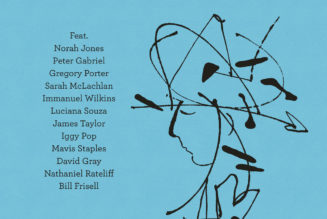
Egyptian megastar -dubbed the king- Mohamed Mounir has released his latest song titled “Ya Falastini” to support the Palestinians in Gaza amid the ongoing military attacks from the Israeli occupation forces on Gaza Strip that resulted in the martyrdom of over 10000 civilians.
“Ya Falastini” song is composed by Khaled Sharif and written by Essam Abdallah.
Mounir song highlights the sacrifices Palestinians in Gaza Strip make everyday as result of Israeli occupation forces brutal military attacks.
Mounir previously released songs supporting the palestinian cause including “Atahada Layalek Ya Ghroub”, “Al-Quds”, and “Al-Amarah Al-Amarah”.
For Egyptians Mounir is not just a legendary singer but he is the melodious Nubian voice that they were grew up hearing it and strongly attached to.
Mounir was born in Aswan, and came to Cairo with his family after the immigration of Nubian people during the High Dam construction.
He graduated from the photography, cinema and TV department, Faculty of Applied Arts, Helwan University, and he started his musical career in the late 1970s.
He started his career by singing with his brother Fouad, who supported Mounir throughout his journey.
Mounir’s had his real debut when he met prominent Egyptian poet Abdel Reheem Mansour and Nubian musician and singer Ahmed Mounib.
The meeting heralded cooperation between international jazz legend Yehia Khalil, Mounir, Mansour and Mounib, who changed the shape of Egyptian music and constructed an influential chapter in Arabic music history.
Mixing Nubian music with the scale of fifths, which is also known in Arabic as “Al-Selem Al-Khomasy”, made Mounir the first Arab singer to introduce jazz music to Arab listeners.
“Shababik” was listed as one of the best Arabic/African music albums.
Singing in a mixed Egyptian/Nubian accent is one of the definitive features of Mounir’s musical style.
Mounir sang in a pure Nubian accent in the song “Shamandoura,” and in a Moroccan accent in “Hikmet Al-Aqdar” [The Wisdom of Fates].
Believing in the cultural role of music and cinema, Mounir acted in many films and series such as “Al-Youm Al-Sades” [The Sixth Day] and “Al-Maseer” [The Fate] with veteran late Egyptian director Youssef Shahin.
He also played the role of the singer in “Al-Malek Howa Al-Malek” play.
The last role Mounir played on screen was in 2016 in “Al-Moghani” [The Singer]; a documentary series tackling Mounir’s own biography.
Peace, love, hope, Egypt, and childhood are the main themes of Mounir’s songs.
“Al Ard Wal Salam” [The Land and Peace] was Mounir’s spiritual album, released in 2002; the album brought him CNN’s Prize of Peace. Mounir also won MEMA in 2008 for Best Singer.
It is worth mentioning that Mounir won the Platinum Award for Best Arab Egyptian singer from the international music production company Universal and was awarded the Diamond Award by BAMA Awards.
His song “Yasmina,” which featured Adel al-Tawel and Ich Und Ich band, sold 700,000 copies in Germany, while “El-Laila Ya Samra” was listed as one of the best 50 African songs of the 20th century by BBC.
Furthermore, Mounir sang the official theme song of one of the most famous Egyptian cartoons ever; “Bakkar.”
Acting spontaneously on stage, and using remarkable casual outfits are the distinguishing features of Mounir’s live concerts.
He released a number of music videos such as “Shetta” [Winter], “Belad Tiba” [Tiba’s Lands], “Madad Ya Rasoul Allah” [Help me, Prophet of God].
Mounir became the first voice of the January 25 Revolution through his song “Ezay” [How], which carried political innuendos.
He is one of the most beloved Egyptian artists by the Egyptian youth and elite alike.
Cooperating with a number of leading artists, Mounir released “Aa’lam Gadeed” [New World] with Hamid al-Sha’ery, “Belad Tiba” [Tiba Lands] with Anoushka, “Leh ya Donia El-Wahed” [Why Life] with Khaled Aggag, and “Al-Qahera” with Amr Diab.
In 2017, Mounir cooperated with Adel al-Tawil in “One World”. The German Ministry of Education has decided to teach ‘’One World’’ song to 4th, 5th and 6th grade students in German schools.
”One World” song tackles refugees’ crisis, and was released in 4 languages, Arabic, English, French and German. The aim behind this decision is teaching the children the idea of accepting others and how to be able to live together peacefully, despite coming from different backgrounds.
On the other hand, Mounir dubbed the king previously expressed his great pleasure as a result of this decision.
In general, the king explained that this decision proves the importance of music and art in enlightening societies and countering terrorism. He added that this is the true role of art, in dealing with the extremism in all aspects of life.
“One World” song is a trio by King Mounir, the German Egyptian singer Adel Tawil and the world Music Award winner Youssou N’Dour. The song was dedicated to the refugees.
It was released in 4 languages, to reach the largest number of audiences around the world. The song aims to destroy all the barriers between humans and strengthen the ties that connect them to each other.
Mounir previously announced that he was preparing for this song from a long time, especially that this song is about refugees’ crisis, which is considered a vital world-wide issue.
Mounir’s career comprises more than 30 albums including: “Momken” [Maybe], “Wist Al-Dayra” [In the Center of the Circle], “Shababik” [Windows], and “Etkalemi” [Speak Up]. He is still capable of introducing innovative music and performing live, and he is still enriching the music scene locally and internationally.
Born in Aswan, Mounir inherited a sense of love and belonging for the Nile. Even when he moved to Cairo, he took the Nubian culture with him.
Mounir’s music reflects his Nubian culture, and his contribution to the Arab music scene is almost unbelievable.
He was the first Arab/Middle Eastern singer to mix jazz with Nubian music, developing the inherited Nubian music scales and combining them with new, universal jazz music.
Furthermore, Mounir helped introduce many Nubian concepts into Arabic music, which is obvious in his song “Wist al-Dayra” (In the Circle’s Center).
Many of Mounir’s songs have an orchestral backing, enhanced with magnificent tunes of the Oud.
Songs such as “Borg Hamam” (Pigeons Tower, 1995) and “Shababek” (Windows, 1981) best demonstrate this unique aspect of his music.
Using oriental drum beats, Mounir performs dynamic songs based on folk tunes, such as “Al-Nawasy” (Sidewalks, 2001), in which the drum beat is reminiscent of the familiar beats of “Al-Zar”.
He also produced notably oriental-sounding songs such as “Eqrar” (Endorsement, 2004).
He frequently enriches his music with rock tunes, especially in live concerts. One of the best examples is his song “El-Kon Koloh Beydor” (The Universe is Spinning, 1981) or “Ezai” (How, 2011).
Mounir added female vocals to paint the music with more emotional and attractive colors in his song “Sheta” (winter) in 1995.
Mounir released his latest song entitled ‘’ Mahmoum’’ ( Careworn) on July.
‘’ Mahmoum’’ is written by Amir Teima, composed by Waleed Saad and distributed by Ahmed Ibrahim.
After 17 years of absence Mounir participated in Jerash Festival for Culture and Arts performing a concert on July 27, 2019.








